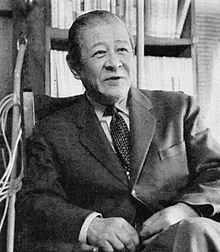Nakajima Kenzō
Nakajima Kenzō ( Japanese 中 島 健 蔵 ; born February 21, 1903 in Chiyoda , Tokyo ; † June 11, 1979 ) was a Japanese translator, literary scholar and critic.
Nakajima studied French at the University of Tokyo , where he also lectured from 1934 to 1962. Before the Second World War he emerged as a translator and author of essays critical of literature and culture. In 1934 he published Kaigi to shōchō (Skepticism and Symbolism), in 1936 Gendai bungeiron (On Contemporary Literature) and in 1941 Gendai sakka ron (On Contemporary Authors), a study of Yokomitsu Riichi , Ibuse Masuji and Takami Jun .
After the war, Nakajima was involved in founding the Japanese PEN Club . He founded the literary society Nihon hikaku bungakukai in 1948 and the Japanese-Chinese cultural society Nihon-Chūgoku bunka kōryū kyōkai in 1956 . In 1950 he became head of the Central Committee of the Shin nihon bungakukai literary society .
In 1951 he published a biography of André Gides ( Andōre Jiidō shogai to sakuhin ), in 1957 a representation of the Shōwa period and in 1966 a book on contemporary culture ( Gendai bunkaron ).
Kenzō died of lung cancer in 1979.
Individual evidence
source
- Shūichi Katō, Chia-ning Chang: A sheep's song: a writer's reminiscences of Japan and the world , University of California Press, 1999, ISBN 9780520219793 , p. 166
| personal data | |
|---|---|
| SURNAME | Nakajima, Kenzō |
| ALTERNATIVE NAMES | 中 島 健 蔵 (Japanese) |
| BRIEF DESCRIPTION | Japanese literary critic and translator |
| DATE OF BIRTH | February 21, 1903 |
| PLACE OF BIRTH | Chiyoda , Tokyo |
| DATE OF DEATH | June 11, 1979 |
